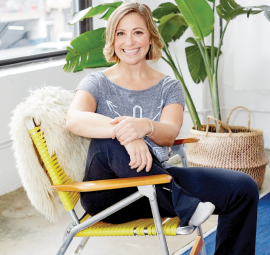Nearly a decade ago, my mother tested positive for the BRCA1 mutation; soon after, my twin sister and I were tested for the inherited defective gene, and I learned I, too, have the BRCA1 mutation. My sister is not a carrier of the mutation. Although there is a long history of both breast and ovarian cancers in my family, the information hit me hard. I knew that having this harmful genetic mutation put me at high risk for developing breast and ovarian cancers, but 9 years ago, I didn’t have the medical information I needed to make an informed decision about reducing that risk.

Carrie Kreiswirth
I was aware that some carriers of the gene opt to have a prophylactic contralateral mastectomy and an oophorectomy to mitigate their risk of developing breast and ovarian cancers. But at age 33, I was too connected to those body parts and what they represented to me as a woman to contemplate such a drastic move. Instead, I decided to undergo intensive surveillance for early detection of breast cancer, including yearly mammograms and biannual magnetic resonance imaging (MRI) tests. Soon after, in 2013, an MRI scan detected a suspicious mass in my left breast, which was later determined to be stage I triple-negative invasive ductal carcinoma.
Adjusting to a Life Interrupted
I learned of my diagnosis while at work and, as a layperson not steeped in the science of breast cancer, I wasn’t sure what the diagnosis meant, although I knew it wasn’t good. The physician who called to tell me the news kept using words like “aggressive” and “invasive” to describe the cancer, and I was reeling. I couldn’t connect the words “I have cancer” with my being; my mind just couldn’t fully comprehend—or accept—what was happening.
I got the diagnosis on a stifling hot day in August. The only place in my apartment that offered any relief from the oppressive heat was the bathroom, and as I sat down on its cool tiles, the severity of what I had just learned hit me. For the first time that day, I started crying, both from the fear of what lay ahead and the recognition that my life would never be the same.
Living With Uncertainty
After getting second, third, fourth, and fifth opinions about my treatment options and likely prognosis, I knew my only recourse was a contralateral prophylactic mastectomy, followed by chemotherapy. The fact that I had decided to have DIEP (deep inferior epigastric perforators) flap breast reconstruction immediately after the removal of my breasts helped to ease the debilitating sense of loss I was feeling, but the scars along my chest and abdomen left me feeling deeply vulnerable. Knowing that the recommended adjuvant chemotherapy regimen, which included docetaxel and cyclophosphamide, would affect my fertility, perhaps permanently, I underwent fertility preservation. Although knowing my eggs would be protected and preserved for my future family planning was comforting, I was still on an emotional roller coaster.
“At least for me, cancer has irrevocably changed my life—in ways good and bad—and while I’m still in the healing process, I’m starting to gain perspective.”— Carrie Kreiswirth
Tweet this quote
There is so much loss with a cancer diagnosis. In addition to having to get used to a new body image, the chemotherapy rendered me bald, taking away another aspect of my femininity. And cancer was not through with me yet. Because of my BRCA1 status, 4 years ago, I made the decision to have my ovaries and fallopian tubes removed. Hopefully, the fact that I still have my uterus intact will make it possible for me to carry a fetus to full term in the future, but there are no guarantees.
Finding a New Life Purpose
Nearly 7 years after my breast cancer diagnosis, I remain cancer-free, but the threat of a recurrence haunts me. I try to stay optimistic that cancer is behind me, and I’m grateful every day to be alive, but, I admit, the journey from patient with cancer to survivor has been difficult. After completing treatment for the cancer, I no longer knew what my place was in the world, and I became reclusive. I was in a very dark place for a long time, but I slowly began to find my new life purpose.
There is a huge misperception in society, and I think in the medical profession as well, that once treatment is over and you’ve been declared “cancer-free,” your life goes back to “normal,” but it doesn’t. At least for me, cancer has irrevocably changed my life—in ways good and bad—and while I’m still in the healing process, I’m starting to gain perspective.
Although I wish I had never had this diagnosis, cancer led me to reexamine my life purpose and has put me on a more fulfilling professional and personal path. I changed my career trajectory and am now working in a field that has a direct impact on people’s health, including those with cancer, and the work is rewarding. I have also become very connected to the cancer survivorship community and am grateful to be able to support and comfort others going through this journey.
Cancer took a lot from me, including my innocence and youth. But it has also given me a deep appreciation for life that I otherwise might not have had. Hopefully, that life will be long and well spent.
Ms. Kreiswirth is Director of Public Relations for Remedy Health Media. She lives in New York City.
Editor’s Note: Columns in The Patient’s Corner are based solely on information The ASCO Post received from patients and should be considered anecdotal.

